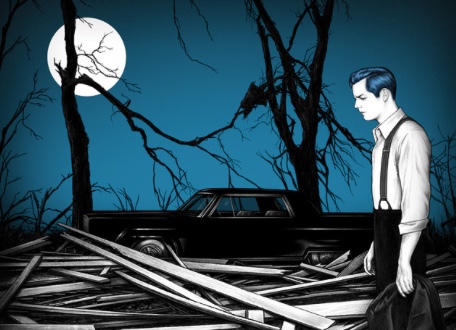
By AVA LIVERSIDGE
Jack White is the music industry’s most exciting outsider. In fact, the career garage rocker-turned Willy Wonka-esque vinyl mogul has created a music industry microcosm of his own via the Third Man Records universe.
White’s latest LP, released April 8, Fear of the Dawn is hard to pin down; the writing of this review may even be in vain. White has forever been characterized as a Luddite or a traditionalist—he famously doesn’t own an iPhone and, for many years, cut his entire discography on tape. On Fear of the Dawn, White ages about a millennium and reveals himself, finally, as not a Renaissance man at all, but a futurist at his core.
Fear of the Dawn is an epic work in the art of synthesis—White does not eschew the bluesman in favor of the cyborg; aural references to Zeppelin, Scratch Lee, and Calloway make a smattering of White’s sonic legacy across the record. These touchpoints are simply shrouded in dense fuzz, interrupted by a cacophonous percussive interlude, or accented by any variety of digital flourish made possible by the musician’s recent embrace of Pro Tools technology. White has already proved he can do it, succeed on analog, on plastic guitars from Montgomery Ward, on eight-tracks. On Fear of the Dawn, it seems what was ultimately important was producing a wholly new body of sound for White; he succeeds.
The result? A track like “Hi-De-Ho” featuring the Tribe Called Quest MC Q-Tip wherein White transplants a sample of Cab Calloway’s “Hi De Ho Man” into an eclectic terrene of animatronic vocals and amorphous rhythmic webs. “Hi De Ho” is a far cry from White’s first ode to Calloway—his initial being a rudimentary cover of “St. James Infirmary” on the White Stripes’ debut LP in 1999—and is the quintessential example of how White’s influences may have become less legible, but are no less forceful amidst his foray into Galactica.
This past/present dynamo is best displayed on the record’s lead single “Taking Me Back” which was aptly released in two versions—the regular, a hard-rock cut with a steely edge and sharply crafted audio perfected with digital editing, and “Taking Me Back (gently),” the acoustic cut recorded with a live band through 1940’s-era microphones. They’re both delightful; White is almost coy in so explicitly providing evidence that he can do both.
Of course, there are more covert references to White’s rich songbook: “Morning, Noon, and Night” finds the songsmith reflecting on the characters that have inhabited his past lyrical universe (“I don’t have time for martyrs / I don’t have time for ghosts”) These growing pains are paralleled instrumentally—jangly ragtime piano juxtaposes against a flurry of serial synth lines as the track builds momentum.
There was an outcry when White released his 2018 LP Boarding House Reach as it was the rocker’s first venture into the work of digital editing and twenty-track cuts, and the outcry continues. But, the blues touchpoints that once drew so many to the musician still run deep throughout his supernal soundbytes. That and it was a mistake to make White out to be an anachronist in the first place—he was always an inventor. He did the bare bones thing, mastered it; now, to space!
Fear of the Dawn is a cohesive twelve-track run of heavy rock cuts bounded by near-gospel urgency—think one man versus the universe in a showdown of violent space oddities (In fact, White played the majority of the instrumentals heard on the record himself as the project came together in his private, one-room studio). The title track, “Fear of the Dawn” pretty much sums it up with its crunchy guitar leads and soaring rhythmic delirium. The record-defining instinctualism is best exhibited in “What’s the Trick’s” frenetic rap cadence and walloping guitar fuzz.
Cooling off, “Shedding My Velvet” is a groovy slow-burn that displays White’s guitar prowess throughout, highlighting the instrumental craftsmanship that he can do just as well as the hard rock flurries; a heavy bass line imbues a funk element to the comparatively cleaner cut as far as special effects are concerned. “Eosphobia” (translation: “fear of the dawn”) and its loose jam reprise both charge and sprawl as the fear takes hold, getting into some hearty riffage whilst touring drummer Daru Jones attacks with heady rhythmic polymath.
Fear of the Dawn is apocalyptic cyberpunk. I hear a Maggot Brain style trepidation across the leaded record. White’s seemingly innate paranoia has driven him to bizarre, unorthodox territory for as long as he’s been making music; his latest is no different. It’s clear that the music is in charge of Jack White, not the other way around, and this razor-sharp instinct that commands Fear of the Dawn will continue to drive him up, up, and away. To many more.
